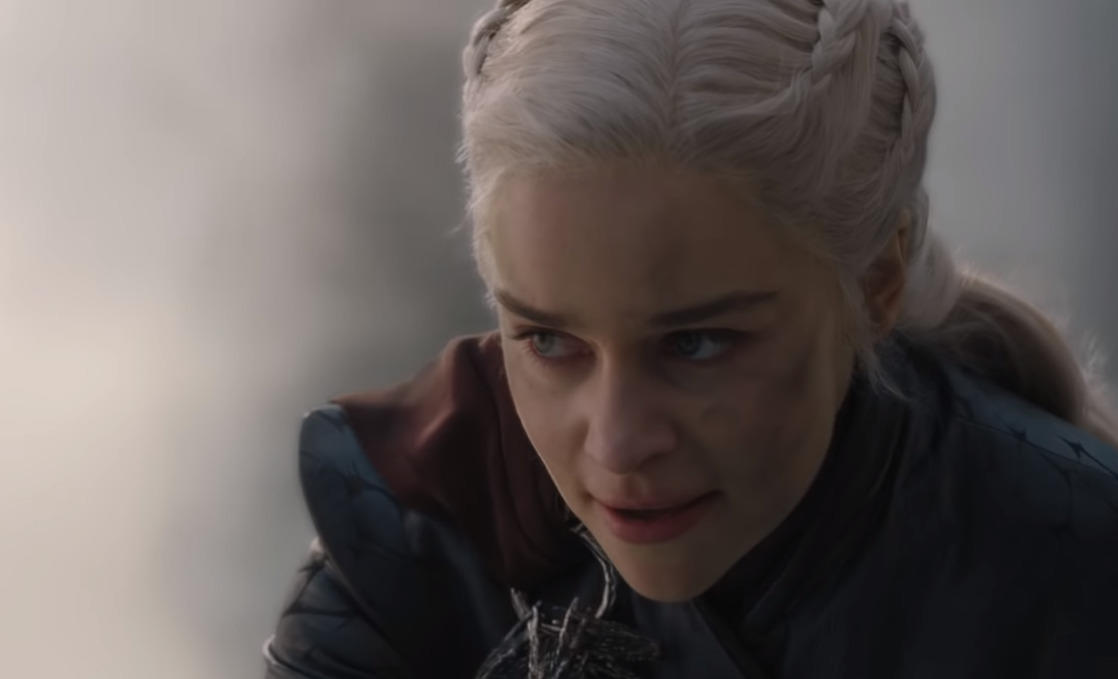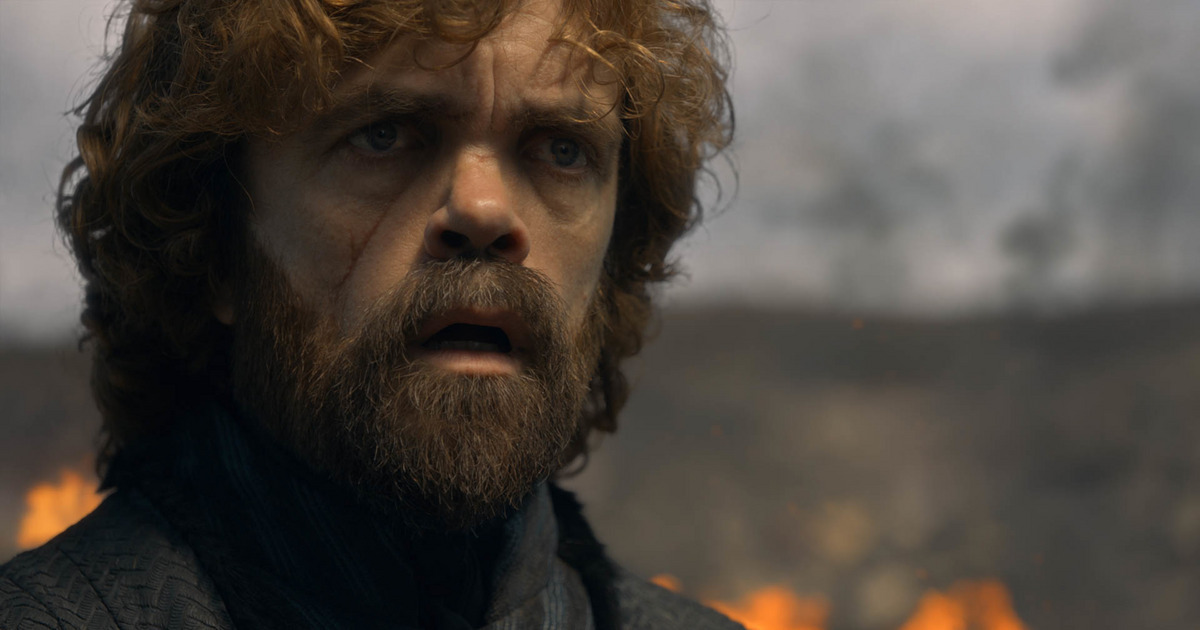Be warned: Beyond this point, there are massive spoilers for Game of Thrones Season 8's Episode 5 and Episode 6 finale.
Even after her devastating choice in Episode 5, Daenerys was apparently still intent on breaking the wheel in the finale. And not just in Westeros, but across the world, as she delivers an inspirational speech to her army that asks them to support her in continuing the endeavor of breaking the wheel. But her means for doing so aren't enough to convince Jon, who prevents the potential massacre of further innocent lives by killing Dany as they embrace. But her death does lead to the potential breaking of the wheel, as Tyrion proposes a king in Bran who is unable to father children, meaning his eventual replacement will be chosen (by people like Robin Arryn, who showed up out of nowhere), not granted the title by birthright. Read on for our thoughts about Dany's turn to Mad Queen after Episode 5.
For a lot of viewers, the most recent season of Game of Thrones feels different than previous ones. It might be that there are no new books to act as a map for where the show is headed, or that shorter final seasons make it feel like character development has been pushed aside in favor of major plot moves. Regardless of the cause, there's a general reaction among many that something just feels off.
There’s something else fundamentally underpinning reactions, though, even if fans aren't not as aware of it. Game of Thrones, it turns out, is not about what we all thought it was about.
In Episode 5, "The Bells," Game of Thrones finally takes Daenerys Targaryen from "worryingly willing to burn to death anyone who disagrees with her, but generally out for good" to full-on "child-murdering Mad Queen." She accomplishes what her father never could: She "burns them all" in King's Landing, regardless of whether they're civilian or soldier, or whether it wins her the throne or not. Daenerys's reactions to the loss of two of her dragons, the betrayals in her ranks, and the unwillingness of Westeros to bend to her will finally cause her to snap, and from the back of her last dragon, Drogon, she brings fire and blood to her former home.
Ask many fans/viewers/etc. and they'll say the show has been foreshadowing Daenerys bringing destruction to King's Landing all along. Dany has always been a ruthless character when she has to be, often electing to execute people in a generally cruel and unusual way: by burning them alive with dragon fire. She's particularly unforgiving to people who oppose her, especially when they don't immediately bend the knee. There have been plenty of times when Dany has wanted to just ravage everyone in her path, only to be curbed from her most merciless instincts by her advisers (most notably Jorah Mormont). With most of those people now dead and Daenerys currently at her lowest, she finally gave in to her Targaryen rage.

It's true that Game of Thrones has been foreshadowing that this could happen, but it's unfair to say that it always suggested that it would happen. Really, this goes to the fundamental conflict of Daenerys's character: She's struggling not to become her father, or to fall into the patterns of other monarchs who use their power mercilessly. Daenerys can be ruthless, but she learned a lot in Meereen not just about how to conquer, but how to rule. She has a highly tuned sense of justice. She considers herself the Breaker of Chains, and this is just as an essential part of her identity as being the Mother of Dragons.
Midway through "The Bells," we finally get Game of Thrones' overall thesis statement. The show is a tragedy in which the characters can't break free of their pasts. Power corrupts the powerful, even those with the best intentions. Monarchy is bad. The world is a cold, hard place, where you'll probably die badly and abruptly for no reason; if you're lucky, you'll die badly and abruptly because of a mistake you made two seasons earlier, but at least it'll feel deserved.
The trouble is that Game of Thrones has made thesis statements in the past--or at least, it felt like it did. The most notable was a declaration from Daenerys herself from Season 5, in which she explained her intention to "break the wheel." The system of inherited wealth and power, and constant war over both, destroy people needlessly. It makes the world a bad place to live. It could be better. And Daenerys intended to use her considerable power to improve it.
Daenerys made another similar statement to the same effect when talking to Tyrion in Season 5. Tyrion dispelled Dany's notions of her family being unjustly evicted from the Iron Throne by explaining why her father, the Mad King Aerys Targaryen, was deposed: He became a paranoid and vicious tyrant. With an understanding of what her father had become, Daenerys made a decision to become something else.
"Our fathers were evil men," Daenerys said. "All of us here. They left the world worse than they found it. We're going to leave the world better than we found it."

Over and over again, Game of Thrones has felt like this was what it was really about: When given the choice, even in the face of tragedy and hardship, what do you leave in the world? It's central to the stories of the Stark kids: Jon Snow fights for the good of the realm, up to and beyond his own murder; Sansa Stark learns how to be the best power-seeker in Westeros, but uses those lessons to win independence for the North; Arya Stark is driven by nothing but revenge, until she reestablishes her connections with her family. It was Daenerys's story too, obviously. And it was the story of the Lannisters, who represented the other side of the coin, fully willing to add ruin to the world so long as they were protected. Really, just about every character, from Jaime Lannister to Brienne of Tarth to Sandor Clegane, is trying to shake off the weight of their pasts, to turn away from the path determined by what they've done and what was expected of them, with each achieving varying degrees of success.
In fact, this line of thinking was why the elimination of the Night King mid-season could have been a brilliant move for the show. Fighting the army of the dead brought unity to a variety of people, including former enemies, in the middle of Season 8--but unity against a common enemy only survives as long as that enemy does. When the Night King is vanquished, can you resist the inertial pull to go back to the old petty squabbles that end up costing lives? Dealing with that question is what made Cersei Lannister a better villain than the wordless Night King because she held up a dark mirror of what Daenerys (and other rulers) could easily become. The Night King was an external existential threat, but Cersei represented the threat the characters pose to themselves and each other.
With Daenerys's choice to go full war criminal over King's Landing as the bells start ringing, Game of Thrones makes a choice about which show it is. If Daenerys had felt rage and suffering and considered giving in to those feelings (how easily someone with her power could), but turned away from that choice even with no better angels like Jorah or Tyrion to mutter in her ear, the show really would be about breaking the wheel. Its ultimate message would be that people aren't beholden to our cycles and our baggage, or to the sins and expectations of our parents. The world can be better, but you have to make it better, just like you have to make yourself better.

Instead, Game of Thrones chooses a darker, more nihilistic meaning. Throughout "The Bells," characters fall back into their old ways. No matter how good a man Jaime tries to become, the one person he can't convince that he's changed is himself. No matter how much Sandor Clegane might hope for a life free of violence, the desire for vengeance consumes him. Cersei can't give up her stranglehold on power and control, even in the face of annihilation. Jon Snow's unyielding dedication to his father's ideals of honor leaves him complicit in a massacre. No amount of good intentions (or slaves freed, or cruel institutions crushed) can keep Daenerys from giving in to her worst impulses and becoming the Mad Queen.
The world is bad, it's going to stay bad, and we can't break free of our pasts. Your baggage defines you and even if you try to improve, you're always an inch away from backsliding into becoming the very thing you feared and hated. Life is nasty, brutish, short, and most of all, explicitly, extremely sad because of what we do to each other. The wheel is much bigger than any one person or even any 300-year dynasty, and not even dragon fire can break it. This is just another war in a history full of them.
That seems to be the finality that Game of Thrones has chosen. It's an end that, in a way, has always been written into the show's DNA--but it also seemed as though the whole point of the show was for its characters to overcome it. After having meant so much to so many people, it seems a shame that the "bittersweet" ending Game of Thrones' creators have chosen leans so hard into bitter, and so little into sweet.
Game of Thrones Season 8 concludes this Sunday with Episode 6, the series finale. You can get an idea of where things are going in our finale theories roundup, watching the Episode 6 preview trailer, and checking out new photos HBO has released from Episode 6. We've also gone ahead and explained why some fans are talking about somebody called Young Griff.
